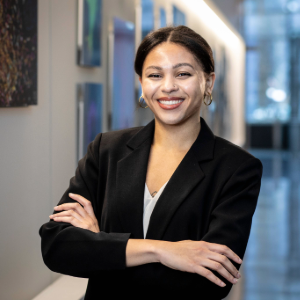
April 2025 Newsletter

April 2025 Newsletter

Student Profile
Kameron Walker is a fourth-year PhD student in the Driskill Graduate Program. In the laboratory of Thomas Hope, PhD, professor of Cell and Developmental Biology and of Obstetrics and Gynecology, Walker’s current research focuses on HIV biology and immunology.
Walker’s interest in science started early – as a high school student, she was drawn to chemistry and molecular biology. During her undergraduate studies at Howard University, Walker decided to further her research through a PhD at Northwestern.
Where is your hometown?
San Jose, CA
What sparked your interest in science or medicine?
Since I can remember, I have always had a passion for medicine. Coming from a three-generation household that participated in community events, the idea of healing and directly impacting others felt natural. My interest grew more in high school, where I participated in AP studies. I was fascinated by chemistry and molecular biology because everything fits together like a puzzle. However, this puzzle could be manipulated, and the field was growing to add more pieces to the picture. Entering college, I redirected from an MD route to a PhD route to support my interests in research. There I joined Karsh Stem scholars and was introduced to mentors that would expose me to the field I am in today.
What are your research interests?
I am primarily interested in virology, specifically HIV biology and immunology.
What are you currently working on?
I am currently wrapping up a project on HIV infection of mature mast cells. We are looking at mast cell dysfunction in the context of HIV- changes in proliferation, protein downregulation during early infection and possibly changes in inflammatory signal production.
Please tell us about a defining moment in your education at Feinberg thus far.
Conventionally enough, a defining moment was during my last rotation. Though I had moved onto the lab I am in today, like many students, rotations leave an impressionable impact. The support and skills I gained gave me the confidence to continue this path.
What do you hope to do with your degree?
TEACH! I would love to teach and expose a new generation to science. Without the support I received in my early education career, I would not be in such a fortunate position to pursue the things I love. I want to be that for the new generation of students- develop scientific literacy, enrich critical thinking and promote the significance of academia.